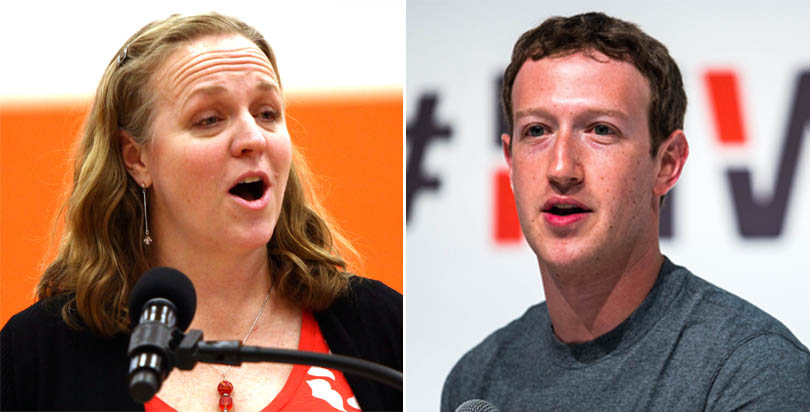Impressive New Scores for Newark Charters Raise an Awkward Question: Did City Pick the Wrong Strategy?

If you Google these three words — Zuckerberg, Newark and failure — you’ll discover scores of now-familiar articles: Philanthropist Mark Zuckerberg kicks in $100 million to rescue Newark schools, politicians and school leaders make fools of themselves and the entire venture floats to the surface as a bloated failure. Done and done.
All the gory details, especially the antics of then-mayor Cory Booker, got laid out in the widely discussed book, “The Prize,” a book that prompted the majority of these articles — including two recent examples from the pages of the New York Times: This past weekend author David Kirp cited Newark in his Times piece as an example of "how not to" fix flawed schools, and just yesterday Andrew Ross Sorkin said definitively that Zuckerberg's gift "was largely squandered.” The only proof he offered: a link to “The Prize.”
Lessons to school reformers everywhere: Don’t even think of doing the same.
But a steady drip of recent data points to a very different story line: Not only did the reforms of traditional Newark Public Schools produce some real benefits, but the relatively small portion of the gift invested in Newark charter schools paid off big. Real big.
The gains are so striking, in fact, that they raise a key question: Why didn’t the Newark reforms emphasize charters from the beginning? If you look across the Hudson River where former New York City schools chancellor Joel Klein produced striking gains by pulling in the region’s top charters with offers of $1 a year rentals to use existing buildings, it’s reasonable to ask (with the admitted benefit of hindsight): Why didn’t Newark do the same?
The latest and most dramatic example comes from test results released to The Seventy Four by the charter network Uncommon Schools for its North Star Academy Alexander Street School: Based on the tough new PARCC tests, in just a single year Uncommon was able to erase years of education malpractice.
Alexander was a school so depressing and so low performing that former Newark Superintendent Cami Anderson told me she used to cry when she visited. Uncommon agreed to assume responsibility for the building and its K-4 students, almost all of whom returned.
When the students arrived the new staff was expecting to find some learning deficits in the students, but they were shocked by the severity: Baseline testing took twice as long as expected because testers kept having to search for ever-more remedial material.
Fourth graders were reading at first grade level, unable to understand phonics. “Once we got these results we had to throw out the playbook,” said school leader Juliana Worrell. “We weren’t able to use our normal curriculum.” They quickly purchased phonics materials and focused just on phonics by 30 minutes a day. “By February we were able to move into reading comprehension.”


Juliana Worrell, school leader at Newark's North Star Academy Alexander Street School (2015) (Photo courtesy Uncommon Schools)
The same happened in math. During morning circle, where students engage in community building exercises that include some numeracy games, the staff immediately noticed huge deficits in counting. Third and fourth graders could not handle simple counting exercises. What to do? Later in the year they would face the PARCC exam where fourth graders were expected to have mastered a full range of math skills.
Again, the staff scrambled, rounding up second, third and fourth grade math books. “We went through them all in just one year.”
The previous staff had warned Worrell that parent participation was a problem. They won’t show up unless you offer a meal, Worrell was told. For the first parent gathering the school offered a full chicken dinner. Still, only about fifteen parents came. What followed was a full court press: Door knocking at home and phoning. Parents who seemed unreachable got put on a list and school staffers would wait for them at pickup times.
By November, the time of school conferences, the school reached 90 percent participation — without offering free dinner. “The parents knew how much we valued this,” said Worrell. “Today, Alexander has a really strong parent council.”
The new test results, with Alexander students coming close to the state average for affluent districts in English and exceeding them in math (see above), is borderline stunning.
Other recent indicators of charter school success include the March, 2015 report from Stanford University’s Center for Research on Education Outcomes. Bottom line: Newark had the nation’s second-strongest charter schools, bested only by Boston. This past November the Center for Reinventing Public Education released a study showing Newark ranked at the top of schools that “beat the odds” for low-income, minority students — a fact explained almost entirely by high performing charters.
Those findings should not come as a surprise. The research on top charter operators there, Uncommon and KIPP, show them to be among the best in the nation. KIPP, for example, educates only 600 high school students in Newark but ranks as the city’s biggest supplier of college-bound African American students.
So again, why did the Newark reformers seem so charter averse? Instead, they spent $100 million (out of the $200 million gift, of which charters got $50 million) buying accountability gains in the teachers contracts — but never achieved the one action that really mattered, ending union protections for ineffective senior teachers.
The awkward bottom line is that Newark traditional schools can’t compete with the top charters — a fact Anderson acknowledges — for really simple reasons: The charters can recruit promising talent and then lavish them with extensive training. Plus, the charters can take advantage of their slim headquarters staff to push more resources to the classroom.
That simple reality makes Newark Mayor Ras Baraka’s recent plea to the state — please refuse KIPP’s petition for five more charters; their expansion plans would drain my schools — sound morally suspect. (He’s also fighting Uncommon’s already approved expansion plan.) How can you justify maintaining a system where fourth graders can’t count to 100? Why not view top charters as just another flavor of top schools within Newark Public Schools?
But the Zuckerberg-powered Newark reforms appear to have been designed to limit charter expansion. Christopher Cerf, who was state education commissioner when the reform push started, and therefore the overseer of charters, recently wrote in an essay published at both Education Post and The Seventy Four: “…there was no plan to ‘charterize’ the district. Ever. I personally went to Washington, talked to Randi Weingarten, and said, ‘If you will work with me on a nation-leading collective bargaining agreement, we will make sure that the great majority of the philanthropy goes into traditional public schools and that Newark would not follow the path of New Orleans.’ And that is exactly what happened.”
Asked about that statement, Cerf told me that suggesting that Newark put the brakes on charters is false. Newark is already on a fast-growth charter trajectory: 30 percent of students now, 40 percent next year. “We spend $231 million per year of public money on charters. That comes directly out of NPS’s $850 million budget. We’ll spend $50 million more on charters next year …The real limit on charters growth is supply and capacity.”
True, Cerf and Anderson did oversee significant charter expansion, now at a third of all students. But in Washington DC, where charters educate half the students, there is near-universal approval of that mix. Let’s hope New Orleans doesn’t get a bad name: The pre-Katrina schools there were every bit as bad as Newark’s were when the state took over, and the charters there have produced unquestioned gains.
As for the pricey priority chosen by Cerf and Anderson, wringing a new contract offering teachers merit pay: I can’t point to a single city where merit pay produces gains anything remotely parallel to the gains top charters such as KIPP, Uncommon, Aspire, Achievement First and Green Dot produce with urban students.
Given the facts on the ground today, the question still has to be asked: What would have happened if Cerf and Anderson had instead taken the Klein approach and pushed the accelerator on Uncommon and KIPP while bringing in more top operators?
The biggest impediment was facilities; specifically, the reluctance to hand over underutilized buildings. Two years ago Uncommon had the school leadership lined up to launch two new schools – but no buildings were offered under what Uncommon considered reliable terms. For Anderson, who was constantly fending off fierce anti-charter pressures, turning over “free” buildings didn’t seem politically viable.
Anderson, who takes great offense when accused of being anti-charter, describes the reality she found when taking over. “The schools in the poorest neighborhoods were losing kids to charters hand over fist, and those schools got even worse. Things were better for the kid winning the charter lottery, but not for the kid stuck in the big engine (NPS) that was failing to respond.”
Charter school growth has “profound consequences,” she told me, later expanding on her thoughts in an email: “I was proud to lead a plan that included one of the most aggressive expansions of good charters in the country. My fierce belief in equity and ‘inventing charter 3.0’ pushed charters to do new things and evolve has been misreported as anti-charter or slow moving or a defender of the status quo. I don't think that is going to help our movement for educational equity grow, learn the right lessons, or get past the unhealthy ‘who is the most charter-friendly reformer’ litmus test (including growing them quickly according to their isolated business plans at all costs). My approach was to support growth and embrace all of what is undeniably transformational about high-performing charters while being brutally honest about the negative consequences and inventing new ways and a comprehensive strategy to address them instead of sweeping it under the rug.”
All legitimate points. It was Anderson who pushed for the One Newark common enrollment process that addresses possible “skimming” by charters. When Uncommon has a vacant seat, they notify One Newark which sends them a student off a wait list. No choosing involved.
And it was Anderson who pushed both Uncommon and KIPP to commit to taking over an entire school — a risky move for charters that prefer to build out their schools one grade at a time. (KIPP’s takeover school, the Life Academy, shows extremely fast academic gains but fell short of the PARCC proficiency scores seen at Alexander.)
"Superintendents should push charter networks to the point of discomfort,” said Ryan Hill, who oversees KIPP schools in New Jersey. “Charter networks need to dig deep."
But with hindsight, that doesn’t explain pouring most of the resources into a district unlikely to achieve widespread success. True, charters are politically sensitive — but less so than the contract reforms pursued by Anderson. How controversial can charters be if they top the One Newark school parent preference list?
Those parents deserve a voice, parents such as Barbara Waiters whose two granddaughters, Anaijah and Jenanisha, were in the Alexander Street School before North Star Took over.
Before the takeover, the granddaughters rarely raised their hands and fell behind on simple math and spelling. All that quickly reversed under North Star teachers. “Before, they didn’t care if the kids couldn’t read or do math,” said Waiters. “Now they’re speaking out in class and getting 100s on their homework. North Star teachers are bringing out something that was deep inside them.”
There is a Newark legacy from the gift, and it runs contrary to the “failure” narrative adopted by much of the press. The Newark takeaway for other cities: Pull in top charter organizations, build an equitable common enrollment system and then push the charters hard to expand in ways that aren’t always comfortable for them. If traditional schools can collaborate with charters, that’s great. If not, keep tapping the accelerator on charter growth.
Get stories like these delivered straight to your inbox. Sign up for The 74 Newsletter

;)
